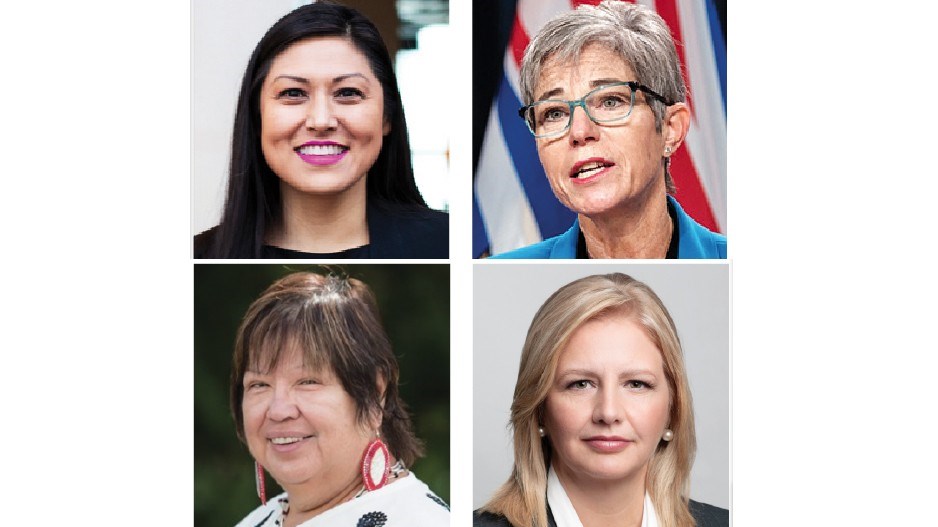BIV spoke to four remarkable female leaders in a special Women in Leadership podcast series hosted by BIV executive editor Hayley Woodin and sponsored by the Women’s Enterprise Centre. Highlights follow from conversations with Webnames.ca co-founder and CEO Cybele Negris, B.C. Finance Minister Selina Robinson, Nuu-chah-nulth Tribal Council president and Vancouver Island University chancellor Judith Sayers and Vancouver Airport Authority CEO and Canada Infrastructure Bank chair Tamara Vrooman.
The answers below have been edited and condensed for length and clarity. Full episodes in the series can be accessed at biv.com/article/WIL.
What has it been like to change roles during the pandemic and enter an industry experiencing a historic amount of disruption?
Vrooman: When I first joined Vancity as CEO in late 2007, it was right at the beginning of the financial crisis, which at that time was the single biggest transition that that economy and that industry had faced. I don’t know if it’s a character flaw or I like a challenge, but I do think in one’s career, you don’t get that many opportunities to really look at an entire industry end-to-end, take a couple steps back, look at everything in order to take that next step forward.
What has your advocacy taught you about leadership?
Sayers: I think leadership is a very lonely place. That often, while people may be supporting you, you’re the one out in front fighting the battles and dealing with any of the negativity that comes back at you for being a voice, for stating what you believe to be true. It’s not an easy road, believe me, to be on. I think what’s strengthened me through the years are my two children who are now grown and fighting with me. But growing up, I was trying to make sure that they had something to live for, something to work on.… As an Indigenous nation, we need to be strong. In negotiations, you have to go in with a clear view and a clear picture of what you’re looking for and what you want. And you’re always maintaining that position. You have to know what you can achieve and what you can’t achieve.
What has been the greatest challenge in your career?
Robinson: My greatest challenge I think is the volume of work and the speed at which you desire to work in terms of bringing change. You see so much that you want to do, but you can only move as quickly as the system moves. You can push the system further, but you also need to bring people along. And I think that’s one of the keys around leadership. It’s not just making decisions and expecting others to just fall in line. We need to bring people along. And that takes time. That means engagement, and that means understanding perspective. That means understanding how it’s going to impact people, and then how do you help them get through to what a change might look like. It’s the desire to move faster and bringing people along, and sometimes they can’t move as fast. That’s always a bit of a tension. That’s hard to reconcile sometimes.
How have your experiences working in male-dominated industries changed over time?
Negris: In the early days when we started Webnames, there were very, very few women in the technology industry. And in my industry in particular – the domain and web hosting industry – it’s been known to be pretty much misogynistic. There was another event and after the formal part of it, everybody wanted to go into a strip bar. I had a choice to make, so I went inside with everyone. I think you have to deal with those types of situations with grace. You don’t want to react too much, but on the other hand, you have to stand up for what you believe in. I sat aside and then started into conversations with people who actually wanted to have a conversation, and ended up doing one of my biggest deals ever – millions of dollars that lasted over a decade. Thankfully, things have changed. Things have cleaned up in the industry, but I think we still have some ways to go.
You are YVR’s first female president and CEO; you were also B.C.’s first female deputy finance minister. What does it mean to you to be first?
Vrooman: Frankly, it’s a little bit frightening always when you’re first, because there’s no road map. And quite genuinely, I know that any success that I have has come with the support of so many people. I really do stand on the shoulders of those who came before me. And in a sense, I really believe in that responsibility, that accountability, to think about what I’m doing for those who follow. So being the first woman means that I take the responsibility for making sure that I make things better for women who follow quite seriously. I want to make sure that I’m paying it forward, because I know that those who come after me will need that same support.
Do you have any advice for the next generation of political and business leaders who may be coming up against barriers in their educational or professional careers?
Sayers: One of the things that I see that is somewhat lacking is having a voice – not being afraid to speak your mind, not being afraid to fight for what you believe in, even though everyone else in the room is thinking differently, or it feels like everybody else in the room is against you. I just think that some people are afraid to venture out when there’s that kind of opposition. But you have to be that voice. Otherwise, there’ll be no change. Everybody will think everything is fine. Being able to advocate is one of those skills that a young leader needs. If people don’t want to listen to you, you will never get anywhere. •




